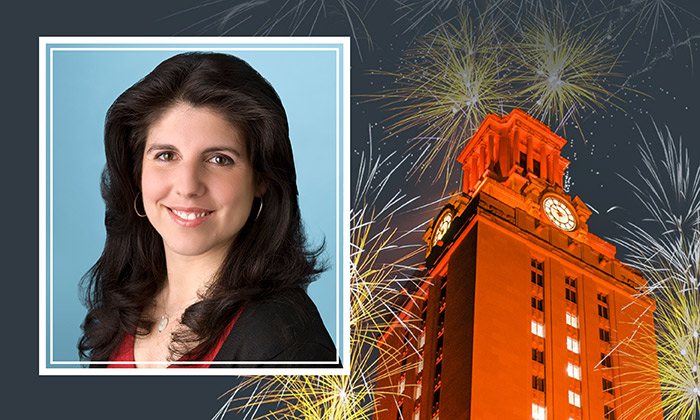Before Elmo and Cookie Monster come alive on the small screen, childhood experts like Jennifer Kotler Clarke, Vice President of Content Research & Evaluation at Sesame Workshop, conduct experiments and review data to ensure these and other Sesame Street Muppets have the intended impact on children, parents and educators all over the world.
Last year, Sesame Street filmed actor Mark Ruffalo talking with character Murray about empathy. This two-and-a-half-minute clip took cues from research like Kotler Clarke's survey of parents and teachers that found a demand for more content to help teach kindness.
Kotler Clarke received her doctorate in Child Development and Family Relationships from The University of Texas at Austin in 1999, and she is this year's graduation speaker at the 100th School of Human Ecology commencement ceremony Saturday. An expert in media and children, she worked with organizations such as the Center for Research on Influences of Television on Children at UT Austin and the Children & Media Project at Georgetown University before returning to her hometown of New York City.
Before joining Sesame Workshop, Kotler Clarke evaluated a school-based violence prevention program at the National Center for Children in Poverty at Columbia University. She now describes herself as a "Muppet lovin'-tennis playin'- data obsessed-child development researcher who oversees research & evaluation at Sesame Workshop (while often singing 80s pop music)." We asked her about her work and her time at UT for our series.
What is it like to shape educational programming for so many children?
Sesame Street is all over the world; the model that Sesame Street developed almost 50 years ago is global. What's so interesting to me is that, while there are obviously some differences in what works in different places, children are children, no matter where they are.
The research group makes sure that the children's voices are represented in the design of our content. We call them the experts—because most of us don't remember what it is like to be of preschool age. I think many people don't realize how much child development expertise and academic research go into deciding what we create for children to watch on Sesame Street.
[In the video made by The Washington Post, Kotler Clarke breaks down the research behind a skit on Sesame Street featuring Cookie Monster]
What was is like to be in graduate school at UT Austin?
I loved being in Austin in the late 1990s. I grew up in the Bronx, and I never thought I'd find myself in Texas. The classes I took really shaped my thinking about children: how they grow and develop, and how community and policies influence that growth. I apply much of what I learned then in my day-to-day work experiences.
Do you have a favorite memory of campus?
I vividly remember walking across campus looking up at the clock tower on a sunny May day, thinking how lucky I was to be almost finished with the Ph.D., how the world was my oyster, and how all things were possible. Then a bird attempted to land on my head—three times—and potentially nest in my hair!
What advice or guidance do you plan to give students graduating from the School of Human Ecology in Natural Sciences this year?
Having a science degree will always serve you well because it teaches you how to process information, be curious about the world and inquire about things you don't know. I think some topics go in and out of "fashion" in education and policy, but having the ability to think critically and how to ask questions is something that has been and always will be essential.
Note: Spring commencement is the time to reconnect with alumni, so this is the third in our graduation-season series about CNS Alumni who Change the World. In this series, we highlight some of the outstanding people who got their start in UT Austin's College of Natural Sciences and went on to transform the world. You can also follow #CNSworldchangers online.









